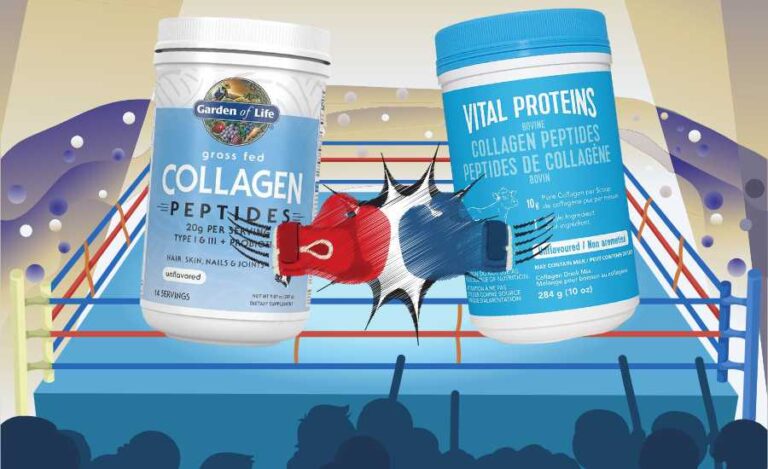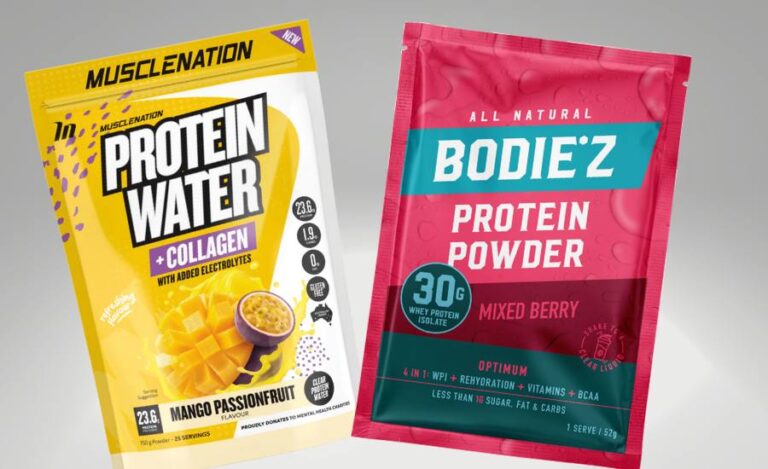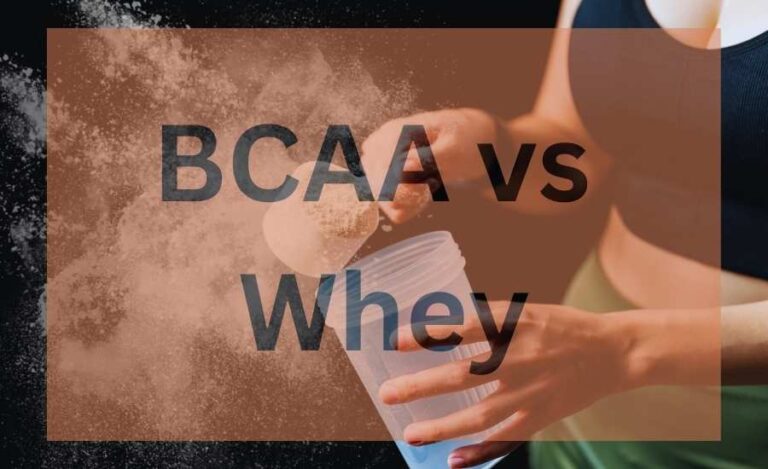1. First, let's see how do protein bars help you lose weight and how they don't.
Protein bars help you lose weight by being a better alternative to sugary snacks.
How do protein bars help you lose weight? Protein bars can serve as a healthier alternative to sugar-loaded chocolate bars and other snacks that are high in sugar and low in protein. It can be a good way to satisfy a sweet craving while adding 10-20 grams of protein to your daily protein macros and can be very convenient when on the go. Or it can be a good post-workout snack.
Must be a part of the big picture.
If you are on a weight loss journey the most important thing you must remember is that it’s your overall daily calories that matter and adhering to your diet consistently over a set period of time. While protein bars can help you lose weight they are not a magic weight loss snack that will solve all your problems.
Can help you curb sweet cravings at night.
What they can do is help you curb that sweet craving late at night when you would otherwise reach for a much higher-calorie snack that often doesn’t have much protein. Or they can be a convenient way and serve as occasional meal replacements when a proper meal isn’t available.
Choose the right type for a fat-loss diet.
If you choose protein bars carefully and ensure they are not very high in calories or sugar then it could potentially save you 2150-250 calories per day and tally up nicely towards your calorie goal. A protein bar that has a high protein content can also help you reach your protein macros for the day. It’s more optimal for high-protein diets and when muscle mass is important. Protein is crucial when it comes to helping you feel satiated for longer and might help you avoid grabbing other high-carb and high-calorie snacks. So can protein bars help you lose weight, yes they can.
Pay attention to your overall nutrition.
On the flip side, relying on store-bought protein bars too often can lead to nutritional imbalances and issues with digestion due to being a heavily processed food. Consuming too many protein bars thinking it’s a healthy choice can actually result in weight gain.
Table of Contents
How do protein bars help you lose weight and how they don’t.
What type of protein bars are there?
Is a protein bar a healthy snack?
Best 5 protein bars you can try in Australia.
Is a protein bar as good as a protein shake?
Is it bad to eat protein bars every day?
Example 1-day meal plan for one of my current clients.
2. What type of protein bars are there?
Nut-based bars.
Some examples at supermarkets are Carman’s, Nice & Natural, or Sam’s Pantry.
These are generally made up mostly of various nuts and maybe even added seeds and most of the protein comes from nuts, making them a more natural choice. However, they are usually higher in calories because the fat in nuts is high in calories and not very high in protein unless protein powder is added to them.
Being made up mostly of natural ingredients they are a better choice for the health-conscious. Being a little more nutritionally complete they can serve as meal replacement bars, as long as you don’t rely on them too much.
Nuts are a good source of fat which can help fight heart disease, but not a great source of protein as many might think. The protein content often isn’t very high like in other protein bars. It ranges on the lower side of between 5-10g of protein per bar but can be as much as 220 calories per bar.
While it can be a good choice for health-conscious nut lovers it may not be the optimal choice for those trying to stick to lower calories and lose weight. But remember, at the end of the day it all depends on your overall diet, so if you can make it work and fit it into your calories then it can still be a part of a weight-loss diet.
Low carb, low sugar high protein bars.
Some examples are low-carb protein bars by Aussie Bodies or Musashi. You may have seen those in the health supplement isles of your supermarket.
This are leaning more towards bodybuilders or fitness enthusiasts who are also trying to stay or get lean. The main goal for the manufacturers of these bars is to create bars that pack the most protein for the least amount of calories.
Ranging between 15-20g of protein per bar with anywhere between 130-220 calories it is the best choice for someone looking to lean out and build muscle. They often can have added amino acids (BCAAs) which is a part of the essential nutrients for our body and can be a part of a healthy diet.
When I am on a shred and trying to get a bit leaner this usually would be the choice I would opt for. These types of bars often contain a fair amount of low-carb protein powder, minimal sugar and carbs, but can taste a bit like, well a protein bar. Which some people don’t love. But I found a few that
Mass gainer protein bars.
Musashi mass gain or Grenade.
Often aimed at bodybuilders whose main priority is getting jacked and growing muscle mass, and usually aren’t concerned with weight loss. If you are trying to lose weight it may not be the best choice as they can stack up to 300+ calories per bar. Even though they often have a very high protein content they are also loaded with carbs and sometimes sugar. Although the 2 brands I mentioned above are not very high in added sugar.
Oat or muesli bars.
Carman’s, Uncle Toby’s or Nature Valley are popular brands.
Often have very little protein so they are not exactly considered protein bars, but rather snack or energy bars and not the best for weight loss especially. They are not any healthier than the high protein bars because most of them still contain the same type of additives but minus the protein supplementation from protein powder. They are usually high in carbohydrate content and often contain sugar or high-sugar syrups.
3. Is a protein bar a healthy snack?
It will depend on the type of protein bar, firstly it’s important to check the nutrition label.
Here is what I look for in a good protein bar when choosing one.
- It has at least 10g of protein for every 120 calories. The higher the calories, the higher I expect the protein content to be, otherwise what’s the point?
- It is sweetened with Steviol or Erythritol as they are naturally derived sweeteners and made from plants.
- It preferably doesn’t contain maltitol as that is the ingredient that can upset the tummy if consumed in large amounts. Usually, 1 bar is ok, anything more with maltitol can cause diarrhea or flatulence.
- It has no or very minimal sugar added or doesn’t contain high fructose corn syrup.
- It has the least possible amount of artificial additives, preservatives, or flavours, although it’s difficult to completely avoid them in most protein bars.
- Addition of some healthy fats from nuts is also a good thing, although if you are trying to keep calories low then you need to tread carefully as nuts are high in calorie
4. Best 5 protein bars you can try in Australia.
I prefer to get my protein bars online as I find they can be a lot cheaper than in supermarkets and also there is a lot more choice as well as many different flavours. However, there are a few you can get at your local Woolworths or Coles that are decent.
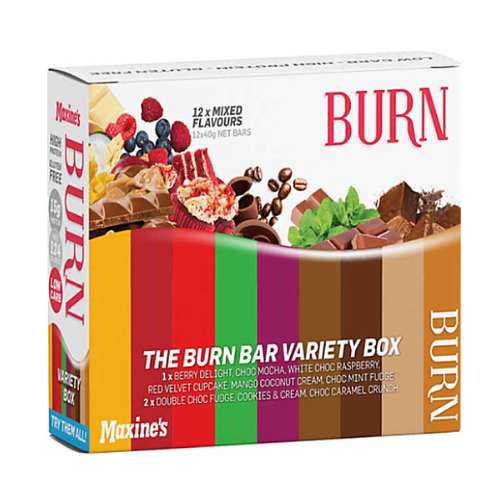
Maxine’s Burn Whey Protein Bars.
With 15g of protein for only 124 calories, it’s a great choice and can be a part of many high protein diets. And it doesn’t contain artificial sweeteners as it’s sweetened with Steviol.
A huge range of delicious flavors from fruity type all the way to rich nutty chocolate to suit every taste. You can pick up a variety box of 12 to find your favorites for next time.
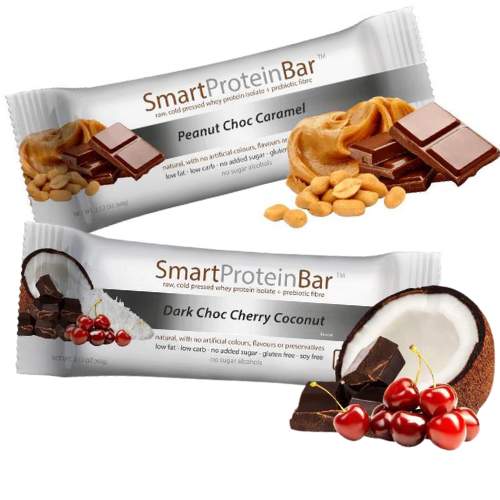
Smart Protein bar.
This divine treat packs 21g of protein inside just 157 calories, and 18 grams of fiber. This definitely gives you a protein boost for fewer calories making it an excellent choice to help you hit your daily protein intake.
Unfortunately, there are no tasting variety boxes like Maxine’s bars above. They have so many different flavors to choose from. I found the fruity type flavors to be a little less sweet than the nutty and caramel types.
By the way, these bars contain the least amount of ingredients or artificial additives from the 5 on the list.
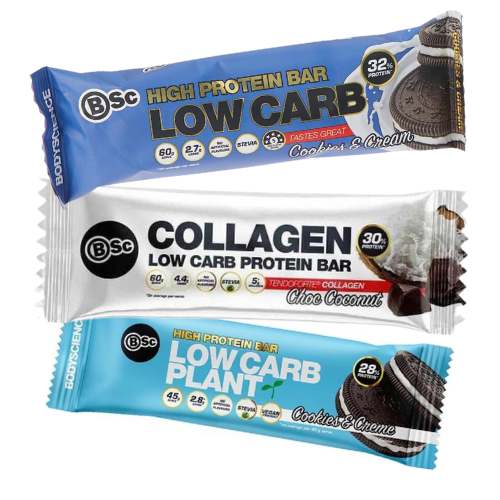
BSC (Body Science) low-carb protein bar.
Another tasty snack on the go is the BSC with 21g of protein per generous 60g bar. 206 calories, it’s rich and creamy with a crunch, without the chalky protein powder aftertaste. It’s on the sweet side rather. They also have a Collagen Low Carb Range and Plant Based options with slightly lower protein content, but still a great option for a high protein snack on the go.
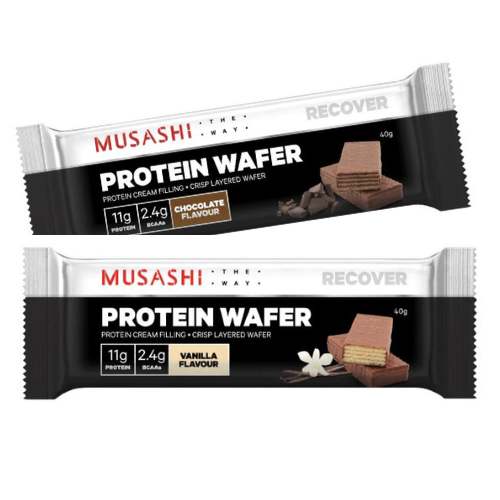
Musashi protein wafer.
If you love a Tim-Tam then the taste and texture of Musashi wafer is very similar in my opinion, but gives you 11g of protein while being low in sugar. 208 calories per 40g bar. If you need a reach crunchy chocolate fix with your coffee this is a perfect choice. It’s light in texture, unlike BSC which is a little thicker and more gooey.

Quest protein bar.
20g of protein for a 190 calories and only 1g of sugar is definitely a great alternative to sugar-loaded snack bars. Although a little on the sweeter side than the ones above. The texture is chewy and rich. Birthday cake is a good one to try.
5. Is a protein bar as good as a protein shake?
If we are talking protein content-wise then no. A protein shake or protein water will almost always contain much more protein than a protein bar.
Most protein bars contain a maximum of around 20g of protein per serving and usually are higher in calories than protein powder. Protein shakes or protein water is usually a lot lower in calories and contain upwards of 23 grams of protein per serve, which may fit a little better with your weight loss goals.
However, from a perspective of satisfaction. You might find yourself a little more hungry at times when a protein shake will not make you feel satisfied or elevate your energy levels. You may also feel like you need something in the form of food to satisfy your hunger rather than a liquid-type meal.
I find it’s good to have both available. A protein shake is great for when you are not super hungry, but just need to hit your protein macros for the day. Or if you have access to fresh water available to add your protein powder to.
A protein bar is great for when you need something more satisfying and you are a little hungry and need something with a few good fats perhaps to hit the spot. Or when water is not available to mix protein powder with.
6. Is it bad to eat protein bars every day?
It depends on what type of protein bars you are having. That’s why it’s important to look at the ingredients list and be able to at least have a basic understanding of what you don’t want in your protein bar. Or ingredients that your stomach might be sensitive to.
Below I will outline a list of ingredients that I try to avoid in an average protein bar if I plan on consuming it more than 2 times per week. Those are ok for now and then consumption and bear in mind that most regular snack bars, candy bars, and desserts on the supermarket shelves contain them anyway, so most of us consume them unknowingly.
List of ingredients to avoid in an everyday protein bar.
1. Maltitol – frequent consumption may upset the stomach and even cause diarrhea. Ok to have 2-3 times per week, I would not recommend having maltitol-containing foods every day. The above-recommended bar that does not contain Maltitol is the Smart bar.
2. Sucralose (sweetener 955) – is a type of sugar that is low in GI, however, it is artificial and not ideal for everyday consumption.
3. High sugar or glucose content – anything above 5g of sugar even if it is natural, as it may add to the overall calories and make the protein bar not so weight loss friendly.
4. You personally might need to check for other ingredients like soy protein if you are sensitive to soy as many of the bars can contain a combination of whey and soy protein powder.
Whilst I like to explore various bars and have a few different choices in my cupboard, I’m personally only ok with recommending the Smart Bar as an everyday protein snack if you must rely on a protein bar as a busy person. Other bars I recommended I would consume 1-2 times per week for some variety.
The bottom line is, whole foods are always the best option, and protein bars are only there to support you when you are in a calorie deficit. So the answer to the question of; Do protein bars help you lose weight, is yes, they can, but only if they are a part of a calorie deficit diet.
7. Example 1-day meal plan for one of my current clients.
Note, this is an example only and customized for my client who is a 43-year-old working mum of 3, and doesn’t have a lot of time to prepare meals. Dinner is different every day and we aim to hit around 30g of protein per meal within around 300-400 calories. She strength trains twice per week and walks or jogs 2-3 days per week with the aim of losing 10+ kilos and gaining muscle tone. This is not a recommendation for a diet for everyone.


